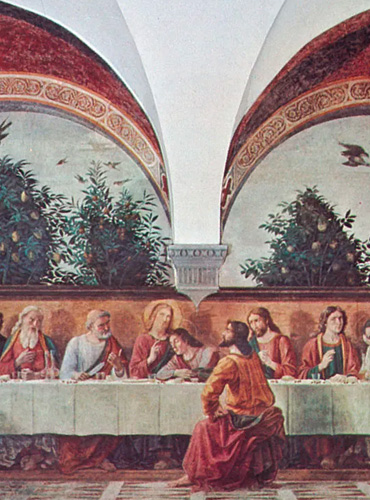Tuesday of the Sixth Week of Easter – Jn 16:5-11
Today’s Gospel continues the Last Supper discourse, that we’ve been hearing the past weeks, and, although the passage is short, there are a number of things that call our attention. Two such things are, first, the phrase, “For if I do not go, the Advocate will not come to you,” and, second, the action of the Spirit, “when he comes he will convict the world in regard to sin and righteousness and condemnation.”
Regarding the first, that Christ must go in order for the Holy Spirit to come, Saint Thomas Aquinas asks if Christ couldn’t have sent the Holy Spirit while He was still present on earth. Aquinas says that, indeed, Christ could’ve given the Holy Spirit to the Apostles while He was still on earth, because He was full of the Holy Spirit since His incarnation; it’s not like Christ had to wait, in the absolute sense. However, Aquinas says it wasn’t fitting for Christ to give it until later, and for several reasons. Two of the most important are, first, that the Apostles needed to purify their love for Christ, since they needed to have a more spiritual, less human, view of things, and, second, because the Divine help comes especially in difficult times. While Christ was present, He was their comfort and strength, so, when He goes, and difficulties and challenges arise, He will send a most fitting help.[1]
Second, John uses a very specific word to describe the Holy Spirit’s work: He will convict, ἐλέγχω (elegchein), the world. The word is a technical one, and more accurately it means to cross-examine a witness, either forcing them to admit their guilt or convincing them of the weakness of their position. The Greeks would use the term figuratively to describe the action of a person’s conscience on their heart and mind.
This conviction concerns three things: “sin and righteousness and condemnation: sin, because they do not believe in me; righteousness, because I am going to the Father and you will no longer see me; condemnation, because the ruler of this world has been condemned.”
“The Holy Spirit will convict men of sin. When the Jews crucified Jesus, they did not believe that they were sinning; they believed that they were serving God. But when the story of that crucifixion was later preached, they were pricked in their heart (Acts 2:37). They suddenly had the terrible conviction that the crucifixion was the greatest crime in history and that their sin had caused it. . . . The Holy Spirit will convince men of righteousness. It becomes clear what this means when we see that it is Jesus Christ’s righteousness of which men will be convinced. Jesus was crucified as a criminal. He was tried; he was found guilty; he was regarded by the Jews as an evil heretic, and by the Romans as a dangerous character; he was given the punishment that the worst criminals had to suffer, branded as a felon and an enemy of God. What changed that? It is amazing that men should put their trust for all eternity in a crucified Jewish criminal. It is the work of the Holy Spirit. It is he who convinces men of the sheer righteousness of Christ, backed by the fact that Jesus rose again and went to his Father. The Holy Spirit convinces men of judgment. On the Cross evil stands condemned and defeated. What makes a man feel certain that judgment lies ahead? It is the work of the Holy Spirit. It is he who gives us the inner and unshakable conviction that we shall all stand before the judgment seat of God.”[2]
So, what does this mean for us? As we approach the solemnity of Pentecost, we should remind ourselves of the action of the Holy Spirit in our lives. Christ gives us the Spirit as a comforter, as a help in difficult times. If it’s better for us to have the Holy Spirit than even to have Christ here physically present, it’s because the Spirit’s working in our souls provides us an even deeper help and interior aid.
Likewise, the Spirit helps to examine us in our lives; He helps to enlighten our minds and our hearts, so that we can see the areas in our lives that need improvement. Sometimes, although we claim to love God, we often fall short; the Spirit comes to convict us of the right way of acting.
We can ask ourselves: are we docile to the Spirit’s inspirations? Do we have recourse to our Comforter in our needs? Do we allow Him to show us what needs to be corrected in our lives?Top of Form
Let us ask, through the intercession of Mary, Spouse and Temple of the Holy Spirit, for the grace to be docile to the Holy Spirit, just as she was.
[1] For this section, see Aquinas’s commentary on the Gospel of John.
[2] Commentary of William Barclay.





